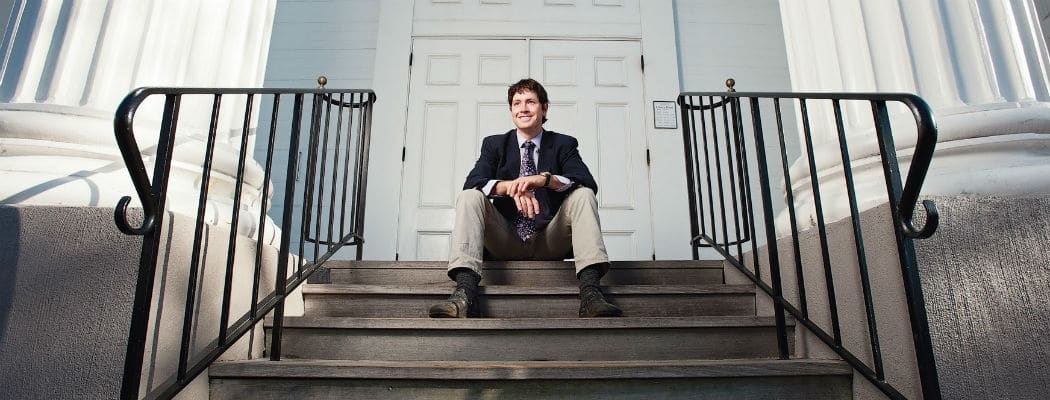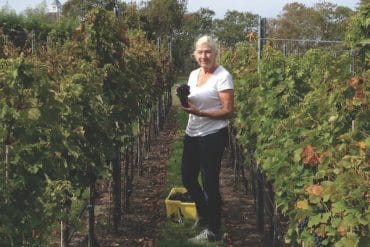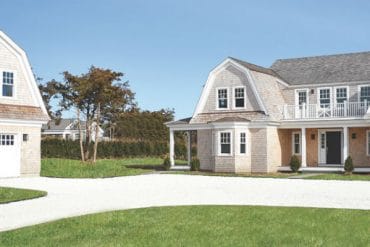Walking on the streets just outside the heart of town, Tobias Glidden gestures at the sidewalk and names the different types of stone. “There,” he says, “that’s pink leviathan.” He talks of the nature of bricks made from Nantucket clay. His attention comes in part from his work as a mason and in part from his deep connection to his environment. At twenty-four years old, Tobias Glidden is Nantucket’s youngest selectman on record, recently winning the election with more votes than any of his competitors, some of which were entrenched island politicos with deeper pockets and more experience.
 Nantucket is in his blood: seven or eight generations (he’s not exactly sure) of Gliddens have made their home on the island. His family has been running Glidden’s Island Seafood for the past five generations, and he recalls mornings as a boy spent chopping fifty-pound bags of onions for his dad. The second oldest of six kids, and home schooled until high school, Glidden has an approach to learning that has little to do with diplomas or certificates and much more to do with experience. “I’m part of this organism,” he says of Nantucket. “I’ve become part of the island and the island is part of me. We are linked together. We share a destiny and a story together.”
Nantucket is in his blood: seven or eight generations (he’s not exactly sure) of Gliddens have made their home on the island. His family has been running Glidden’s Island Seafood for the past five generations, and he recalls mornings as a boy spent chopping fifty-pound bags of onions for his dad. The second oldest of six kids, and home schooled until high school, Glidden has an approach to learning that has little to do with diplomas or certificates and much more to do with experience. “I’m part of this organism,” he says of Nantucket. “I’ve become part of the island and the island is part of me. We are linked together. We share a destiny and a story together.”
Glidden’s reason for running for the Board of Selectmen came from a realization that the problems Nantucket faces loom large and need addressing. “When we look at the way the world is going to be in 2050, we’re looking at huge energy problems, an incredibly different climate,” he says. “People aren’t going to be able to grow food.” He notes that the UN is looking at a 40 percent reduction in food production for 2050. “We are facing real problems.”
By 2015, Glidden hopes to have helped put Nantucket on track to becoming wholly energy independent and a community that is able to locally grow its own food. He likewise wants to develop water policies, as well as create incentives for gardens, farms and pastures to develop the island’s soil resources. Beyond environmental and energy policies, Glidden’s goal is to make people understand the gravity of the situation. “If we don’t have a planet to work with, we don’t have anything,” he says. “And that interplays with human justice and living in an ethical way.”
 For Glidden, lofty goals can be achieved in simple ways, and conversation is a start. He ran his campaign largely by standing in front of the Stop & Shop, making himself available to people to talk to. It’s something he wishes he saw more of on the island. For example, “There’s a number of Hispanic people who come here and landscape, and you’d be amazed how many have been farmers and know a ton of information about how to cultivate crops, and yet they’re never tapped for their resources,” Glidden says. He believes that taking the time to listen and to talk has a large part to play in improving the island, socially, economically and environmentally. “A lot of summer people are awesome — engaged, in love with the island,” he says. “But some of them are in their own world, are disconnected.”
For Glidden, lofty goals can be achieved in simple ways, and conversation is a start. He ran his campaign largely by standing in front of the Stop & Shop, making himself available to people to talk to. It’s something he wishes he saw more of on the island. For example, “There’s a number of Hispanic people who come here and landscape, and you’d be amazed how many have been farmers and know a ton of information about how to cultivate crops, and yet they’re never tapped for their resources,” Glidden says. He believes that taking the time to listen and to talk has a large part to play in improving the island, socially, economically and environmentally. “A lot of summer people are awesome — engaged, in love with the island,” he says. “But some of them are in their own world, are disconnected.”
Glidden considers this “disconnect between the people who come here and the people who live here” to be one of the biggest problems Nantucket faces. He has worked in catering. He’s served people’s meals and he’s laid people’s bricks. Glidden talks of the way he’s been treated by visitors who don’t know who he is and who don’t care to. But it’s more than an issue of ignoring the help. He believes the disconnect between the two worlds leads to more significant problems. “It’s sad to see,” he says of visitors’ indifference to the realities of the island. “As an island, part of our job is to bring those people into reality and talk about what our hardships are.” He mentions the island’s drug problem — people getting addicted to opiates and moving on to heroin because it’s cheaper. “The reason why it’s so prevalent is because of that disconnect. People don’t feel that sense of place, that sense of community.”
Glidden’s cheeks flush when he talks, particularly as he gets more stirred by what he’s talking about. He sounds most like a politician when he says that one of the biggest problems “is forgetting our legacy, our history and who we really are as Nantucketers. We do have an influence on the world, and we can make the world a better place.” Nantucket, he explains, is one of the most influential places on the East Coast, a leader in human rights, women’s rights and environmental consciousness. “I want to continue that legacy on,” he says. “I want to spread that to the next generation.”
 Not long ago, Glidden returned from a year and a half stint on the West Coast where he studied architecture and spent a lot of time “meditating, doing yoga, and trying to live this alternative life where people just try to enjoy their lifestyle.” During his time around San Francisco, he lived for four months without money. “It was the best four months of my life,” he says, smiling. He describes living in a house called Casa de Paza with three friends, spending an hour every morning in meditation, and then “living a life of service.” “We never really wanted for anything,” he says. “People were always giving us vegetables or fruit… It was all just people sharing, living together and it was good.”
Not long ago, Glidden returned from a year and a half stint on the West Coast where he studied architecture and spent a lot of time “meditating, doing yoga, and trying to live this alternative life where people just try to enjoy their lifestyle.” During his time around San Francisco, he lived for four months without money. “It was the best four months of my life,” he says, smiling. He describes living in a house called Casa de Paza with three friends, spending an hour every morning in meditation, and then “living a life of service.” “We never really wanted for anything,” he says. “People were always giving us vegetables or fruit… It was all just people sharing, living together and it was good.”
Glidden’s voice rises with passion as he talks about the housing problems on Nantucket. “All these mansions are completely empty except for two week a year, and at the same time there are people sleeping in crawl spaces just to work for them, just so they can send a little money home to their family in El Salvador.” The island, he explains, is more expensive than New York, London and Shanghai. Glidden has his own peculiar living situation, one he’s not entirely keen on advertising. He built his 144-square-foot “dwelling” when he was eighteen. It’s made of 90 percent recycled materials: old couch cushions as insulation, recycled granite floors. He sleeps under a skylight beneath the stars. “I just need a place to sleep and a place to have my books,” he says. Some favorites include Thoreau’s Walden, Don Quixote and Dostoevsky’s Notes from the Underground. As for the rest of the details of his living space, he wants to leave it to our imaginations. “Part of what’s cool about Nantucket,” he says, “is that we have our secrets. We’re key holders.”
Every Labor Day, the Glidden family has a picnic on Brant Point in what’s become something of a family tradition. They wait for the last slow boat to round the corner on the way back to Hyannis. When it passes they shout and wave, holding flags and a big sign saying “goodbye.” It’s a combination of gratitude and relief and marks the close of the season. Glidden cites it as one of the main reasons he returned to Nantucket from California, for the spectacle of the changing of the seasons. He talks about awareness of shifting light, of the moon and tides, of seeing time pass. “Taking that connection that we feel with the earth and spreading that to the people who are coming here is really important,” he says. Glidden is working to “convert them over to what it means to live a compassionate, fulfilling life so that your tea is just as good as your Dom Perignon.”






